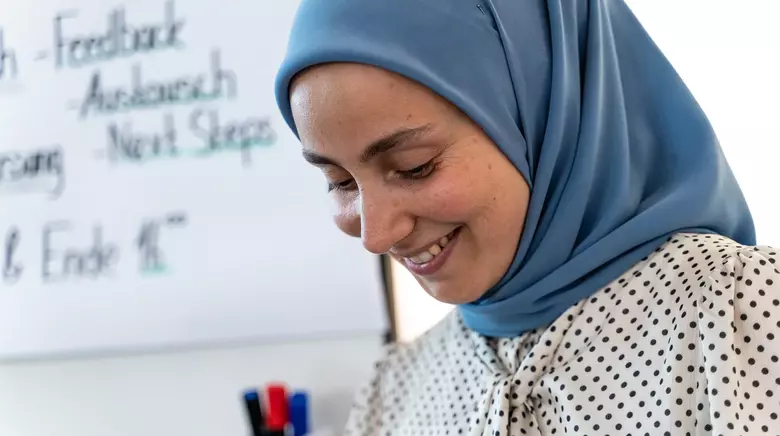Strategies for successful work in multicultural teams and a healthy work-life balance – an interview with Fatma Erol-Kılıç

Berlin is a vibrant metropolis that attracts talented folks from all over the world. The city is a gathering place for international experts and managers. They all work in multicultural teams that benefit from clear communication and strategic collaboration – factors that still present stiff challenges for the management of everyday work routines. Communication and organisational skills are in demand. Which is precisely where Fatma Erol-Kılıç comes into play.
Fatma Erol-Kılıç is a behaviour and communication coach in Berlin and brings her extensive expertise from over a decade’s work in software development and interdisciplinary collaboration as a user experience expert, as well as a decade as a communications expert, to her work as a coach. With a background as a graduate industrial engineer (HTW Berlin), and having completed a thorough training at Arbeit, Bildung, Forschung e. V., a psychology faculty at Freie Universität Berlin, she has been organising workshops, coaching and mediation to support managers, teams and events since 2014.
She focuses on situational communication in a wide variety of contexts, and her clients include ministries, senate administrations and organisations from the private sector and civil society.What’s more, her voluntary commitments include work for the SWANS Initiative, which promotes the professional advancement of students and academics with a migrant background and Black, Indigenous Women of Color (BIWoC).
In this interview, Fatma shares some valuable insights into the dynamics of multicultural teams.Learn about the strategies that sustainably facilitate her everyday work and how you too can build a stable work-life balance. Find inspiration in the practical methods that will help you stay focussed, resilient and successful in a diverse working environment.
The world is your oyster as a coach and mediator. Why did you choose Berlin as your place to live and work?
You could say I’m Berlin born and bred. The city is and has always been perfect for me. I can grow here, regardless of my current life phase. Berlin always has fresh opportunities for me: From my studies to the early days in an SME and start-up to my self-employment as a coach and mediator.
Berlin is the perfect place for my work – the people and organisations I support are gathered here, and ministries and civil society conferences are at home here as well. Quite simply, Berlin likes to invite people and many actors from associations and organisations come together here. The networks in Berlin are also a decisive factor for me. The Chamber of Industry and Commerce Female Founders Days and the Smart Country Convention are just two examples of network events that help my career to develop.
As a mother with children, I appreciate the many green areas, parks and the child-friendly environment – from the sports club to traffic-free inline skating on Tempelhofer Feld. I’m also a religious person, so it’s a real advantage that I can always find a mosque close by. All these aspects make Berlin a unique and fulfilling place to live and work for me.
In your opinion, what professional advantages does Berlin have to offer compared to other German cities?
Berlin is a multicultural metropolis and has numerous networking opportunities and excellent infrastructure. The city is home to colleges, universities, SMEs, start-ups, large corporations and pre-eminent science and research institutions – a strong ecosystem for everyone looking for professional advancement or a change in career.
Regardless of whether you’re studying, taking the next step in your career or want to make a completely new start: Berlin has the ideal conditions and opportunities for any phase in life.
There are lots of international teams working in Berlin. Which challenges do you see for specialists and managers in this kind of dynamic environment?
The first challenge is to accept and integrate the diversity of cultures, languages, attitudes to work and communication styles. Even if the whole team speaks the same language, there are differences in the way we express and perceive things – even the way we understand ‘clear statements’ and ‘hints’ can vary. Some team members communicate directly and objectively, others consider it more appropriate to convey their needs in hints, as they tend to view blunt statements as inappropriate. To navigate these intricacies, we need to be aware how communication styles can impact team goals and performance.
Expressing constructive criticism is considered impolite in some cultures, while others view frank feedback as indispensable. It’s therefore vital for managers to familiarise themselves with the cultural backgrounds and socialisation of all team members and to establish mutually acceptable communication styles. This requires openness, a willingness to step out of our comfort zone and a flexible approach that accommodates cultural nuances and fosters a strong team understanding.
Which communication strategies do you recommend specifically for managers to successfully overcome misunderstandings in multicultural environments?
A key strategy is to realise that each person communicates from their own perspective – which you could describe as the ‘image of their own world’. Instead of assuming that the way they understand a situation is universal, managers should purposefully approach their team and actively enquire about their point of view. One example of an effective question might be: “How do you perceive the situation, and what would you find helpful in a practical sense?” This kind of open-ended question fosters a dialogue in which different perspectives become visible and valued.
Another tip: Listen in order to understand, not to answer. Genuinely open listening means consciously putting your own perspective aside and asking direct questions if anything is unclear. This creates profound understanding and engenders trust.
Also, always make sure that your style of communication is clear, to the point, matter of fact and friendly. Express your expectations objectively, but always remain open and respectful. By being both clear and open in your communication, you will minimise misunderstandings and encourage a productive, appreciative atmosphere within the team.
As a specialist or manager in an international team, how can I promote an inclusive and appreciative working atmosphere?
There are always social roles within teams – such as organising team events or introducing shared routines. Rotate these roles within the team so that everyone has the opportunity to actively shape the atmosphere. Classic team events like an outing to a bar aren’t suitable for everyone: Parents have commitments in the evenings, some colleagues don’t drink alcohol and others feel uncomfortable in dark rooms. Create alternatives, for example a team picnic event where families are welcome. Rotating roles and varying event formats create balance and allow every team member to suggest their own preferences and ideas.
I also recommend regular reviews. Take a short break from everyday life with the team to reflect on what’s working well and where there’s room for improvement. This places a focus on the positive elements, and the shared discussions strengthen team cohesion as well as mutual understanding.
Which routines would you personally recommend to remain focused and productive at work?
Make plans, but without driving yourself crazy! For me, planning is the key to more serenity and structure in everyday work. On Monday I’m already preparing an overview of the whole week – to create clarity and reduce stress. I use a printed calendar with a monthly and weekly overview that shows me both the big milestones and the small, daily goals.
It’s also important to deliberately take a few ‘creative breaks’. For me, this means interrupting your schedule from time to time – whether it’s for a leisurely breakfast, a coffee with your neighbour or a ‘walk & talk’ during lunch break. Moments like these help me to find a healthy balance between work and my personal life.
We are not machines. There’s no reason to feel guilty if something goes wrong. Give yourself space and reduce the pressure – this will keep you focussed and relaxed.
What is the role of self-reflection when it comes to making confident decisions in professional life?
Self-reflection is crucial. You should be conscious about regularly taking a moment to scrutinise your actions and decisions. It’s essential to take breaks to think about what you’re doing and how you’re doing it, and a sparring partner can provide valuable input here – sharing your thoughts with other people helps to shed light on our mindsets and behavioural patterns. Self-reflection is the only way to gain the clarity and authority you need to act confidently and effectively in your day-to-day work.
Finding a balance between work and personal life can be difficult, especially in senior management positions. What tips do you have for a healthy-work life balance?
There is no patent recipe. Nothing is right, nothing is wrong. We’re all unique beings, so the needs we have in life are just as individual.
One piece of advice that I find helpful: make a clear separation between work and leisure. If you are working, then concentrate on that. But then consciously put your professional concerns aside in your free time.
If you think of something at work that you want to do in your private life, write it down or do it quickly to free up your mind and get back to work. And by the same logic: If you think of something work-related in your free time, put it off until the next working day.Be stricter here. If an exception arises and you need to do something for work in your private life, communicate this clearly to those around you. Consciously set yourself a time limit, complete the task and then return to your free time without making compromises.
For many managers, their personal network is vital to their professional success. What advice do you have for purposeful ways to build a professional network?
For me, networks mean: Two people start a conversation and can benefit from it at some point – whether in a month or five years’ time. Maintaining networks is important, both professionally and personally. Sometimes the most valuable tips for your career are found in conversations with your neighbour or other parents in the playground.
So if you attend networking events, don’t be shy of approaching people. I often find that people hesitate to speak to strangers. My advice: Just do it! A friendly chat will always make a positive impression.
View every contact as an opportunity and end promising conversations with “If I ever have something, can I get in touch with you?”. This lays an open-ended foundation for future connections.
Finally, can you give us your top three tips for building resilience and inner strength in day-to-day work?
- Take regular breaks!Time out is important for relaxation and self-reflection.
- When things gets stressful, work for shorter periods but more efficiently! This preserves energy for the next day.
- Move around in your everyday working – whether that’s walking around the room when you’re on the phone or getting out into the fresh air! This enables you to access to the macro-levels of your mind.








